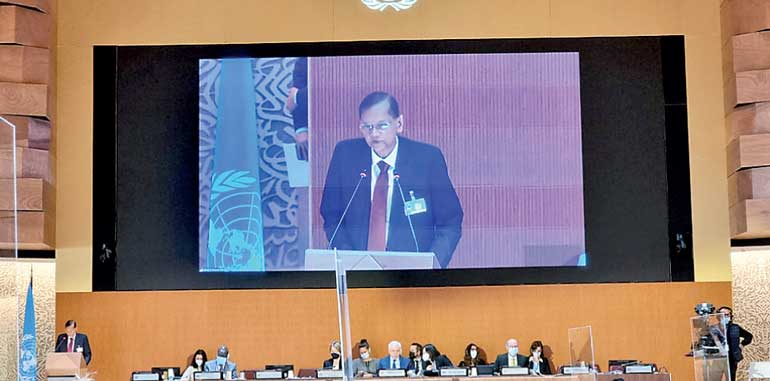Friday Feb 20, 2026
Friday Feb 20, 2026
Wednesday, 2 March 2022 00:12 - - {{hitsCtrl.values.hits}}

Foreign Minister G.L. Peiris reiterated yesterday that the evidence gathering mechanism established under United Nations Human Rights Council (UNHRC) resolution 46/1 is unhelpful to the people of Sri Lanka, will polarise Sri Lankan society, and adversely affect economic development, peace and harmony at a challenging time.
Making a statement at the High-Level Segment of the UNHRC in Geneva, the Foreign Minister also said such a mechanism is an unproductive drain on Member State resources, at a time of severe financial shortfalls across the entire multilateral system including the High Commissioner's Office.
He said that in March 2021, the Council voted on Resolution 46/1 which was tabled without the consent of Sri Lanka as the country concerned.
“The consideration of this matter polarised and politicised this forum. In a startling departure from the mandate which the UN General Assembly originally conferred on this Council, operative paragraph 6 of this resolution refers to a so-called evidence-gathering mechanism, a measure that was strongly opposed by a number of countries.
“Such initiatives create disharmony both in the domestic and international arenas. It creates obstacles to reconciliation efforts, breeds hatred by reopening past wounds, and polarises society,” the Minister said.
Peiris said that the Government takes particular objection to the use of voluntary funding which has the necessary consequence of undermining objectivity and detachment.
He said that Member States of the HRC have mandated it with a truly extensive array of helpful working methods to assist governments in the promotion and protection of human rights and that Sri Lanka has participated actively and constructively in those aspects of the Council's work that have been productive and beneficial.
“We reject those that are punitive, politicised, divisive, unhelpful and initiated due to extraneous reasons,” he said, adding that Sri Lanka, like elsewhere in the world, endeavours to strike a just balance between human rights and national security when dealing with terrorism.
“Sri Lanka is convinced that counter-terrorism legislation must secure and protect the rights of persons subject to investigation detention and trial and must not restrict democratic freedoms such as the freedom of expression,” the Minister said.
He said that a Bill was presented to Parliament which is an initial step in amending the Prevention of Terrorism Act, 43 years after it was promulgated.